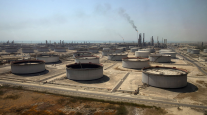Oil in London Set for Biggest Weekly Gain in Eight Months

[Stay on top of transportation news: Get TTNews in your inbox.]
Oil in London was on track for its biggest weekly increase since January as traders waited to see whether Saudi Arabia can fulfill promises to swiftly repair critical facilities attacked last weekend.
The world’s biggest crude exporter has vowed to restore its Abqaiq processing plant and Khurais oil field this month after an aerial strike disabled 5% of global supply and triggered Brent’s biggest-ever one-day jump. On Sept. 20, Saudi Aramco showed reporters the Khurais site, revealing substantial damage to at least two of its five stabilization towers.
Consultants such as Rystad Energy and FGE caution that the recovery could take longer than Aramco has indicated. Saudi Arabia’s resort to sourcing refined fuels and condensates from the market is fanning concerns about the length of the disruption.
“The actual longer-term impact of the attacks on the Saudi oil infrastructure is still difficult to judge because the country is likely to play down any potential problems,” said Carsten Fritsch, an analyst at Commerzbank AG in Frankfurt, Germany.
WANT MORE NEWS? Listen to today's Daily Briefing
The ratcheting up of instability in the world’s most important oil-producing region has raised the risk premium for prices, which are almost $5 a barrel higher than before last weekend’s attacks on the Saudi facilities. The kingdom is also depleting inventories to meet export commitments and operating without its usual buffer of spare capacity, increasing risks for the market should there be other emergencies.
West Texas Intermediate for October delivery gained 97 to $59.10 a barrel on the New York Mercantile Exchange. The American benchmark is up 7.8% this week, the most since June.
Brent crude was at a $6.04 premium to the U.S. marker for November, while the cost of prompt supplies of the London grade against later shipments increased earlier this week to the highest level since late June.
Saudi and U.S. officials have said that the drones and missiles used in the assault on Saudi facilities were made by Iran, though stopped short of saying the attacks were launched directly from or by the Islamic Republic. Iranian Foreign Minister Mohammad Javad Zarif warned on CNN that a U.S. or Saudi strike on his country would initiate “all-out war.”
“The mounting rhetoric between the U.S. and Iran adds to the market’s nervousness, but I see less than a tail-risk of military conflict in the region,” said Vandana Hari, CEO of Vanda Insights in Singapore.
Some of the gains in prices also have been tempered by a storm flooding the U.S. Gulf Coast, threatening to curb demand for crude. The remnants of Tropical Storm Imelda dumped more than 3 feet of rain on parts of the Texas coast, cutting refinery operations and shutting a key pipeline.




